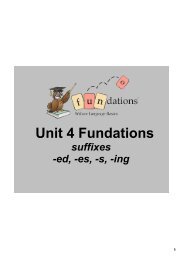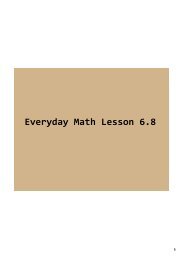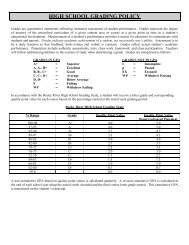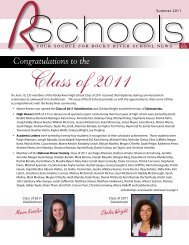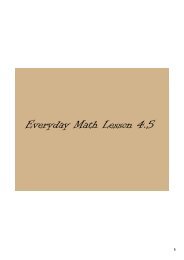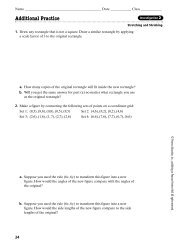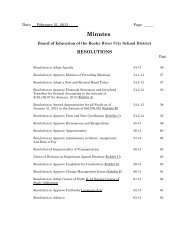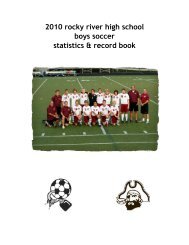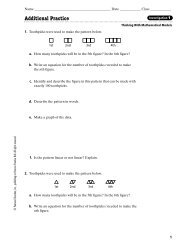ROCKY RIVER BOARD OF EDUCATION - Rocky River City Schools
ROCKY RIVER BOARD OF EDUCATION - Rocky River City Schools
ROCKY RIVER BOARD OF EDUCATION - Rocky River City Schools
You also want an ePaper? Increase the reach of your titles
YUMPU automatically turns print PDFs into web optimized ePapers that Google loves.
E. specify a date by which the WEP will be reviewed for possible revision.<br />
Students participating in gifted services provided outside the general education classroom will generally be exempted<br />
from routine class work (worksheets, homework, etc.) assigned during absences from the regular classroom due to<br />
participation in the gifted services. Students are to turn in work due the day of absence and make arrangements to make<br />
up missed tests. Special class work (projects, book reports, etc.) assigned during the student's absence are to be<br />
completed. Exceptions to this policy will be detailed in the student's Written Education Plan.<br />
The District shall report to parents and the Ohio Department of Education that a student is receiving gifted education<br />
services only if the services are provided in conformance with the Operating Standards for Identifying and Serving Gifted<br />
Students.<br />
R.C. 3301.07(K), 3324.01 - 3324.07, 3315.09, 3317.024(O)<br />
A.C. 3301-51-15<br />
Adopted 9/20/01<br />
Revised 2/19/09<br />
7540.03 - STUDENT NETWORK AND INTERNET ACCEPTABLE USE AND SAFETY<br />
Advances in telecommunications and other related technologies have fundamentally altered the ways in which information<br />
is accessed, communicated, and transferred in society. Such changes are driving the need for educators to adapt their<br />
means and methods of instruction, and the way they approach student learning, to harness and utilize the vast, diverse,<br />
and unique resources available on the Internet. The Board of Education is pleased to provide Internet services to its<br />
students. The District’s Internet system has a limited educational purpose. The District’s Internet system has not been<br />
established as a public access service or a public forum. The Board has the right to place restrictions on its use to assure<br />
that use of the District’s Internet system is in accord with its limited educational purpose. Student use of the District’s<br />
computers, network and Internet services ("Network") will be governed by this policy and the related administrative<br />
guidelines, and the Student Code of Conduct. The due process rights of all users will be respected in the event there is a<br />
suspicion of inappropriate use of the Network. Users have no right or expectation to privacy when using the Network<br />
(including, but not limited to, privacy in the content of their personal files, e-mails, and records of their online activity while<br />
on the Network).<br />
The Board encourages students to utilize the Internet in order to promote educational excellence in our schools by<br />
providing them with the opportunity to develop the resource sharing, innovation, and communication skills and tools that<br />
are essential to both life and work. The instructional use of the Internet will be guided by the Board's policy on instructional<br />
materials.<br />
The Internet is a global information and communication network that provides an incredible opportunity to bring previously<br />
unimaginable education and information resources to our students. The Internet connects computers and users in the<br />
District with computers and users worldwide. Through the Internet, students and staff can access up-to-date, highly<br />
relevant information that will enhance their learning and the education process. Further, the Internet provides students<br />
and staff with the opportunity to communicate with other people from throughout the world. Access to such an incredible<br />
quantity of information and resources brings with it, however, certain unique challenges and responsibilities.<br />
First, and foremost, the Board may not be able to technologically limit access through the Board's Internet connection, to<br />
only those services and resources that have been authorized for the purpose of instruction, study and research related to<br />
the curriculum. Unlike in the past when educators and community members had the opportunity to review and screen<br />
materials to assess their appropriateness for supporting and enriching the curriculum according to adopted guidelines and<br />
reasonable selection criteria (taking into account the varied instructional needs, learning styles, abilities, and<br />
developmental levels of the students who would be exposed to them), access to the Internet, because it serves as a<br />
gateway to any publicly available file server in the world, will open classrooms and students to electronic information<br />
resources that have not been screened by educators for use by students of various ages.<br />
Pursuant to Federal law, the Board has implemented technology protection measures, which protect against (e.g. filter or<br />
block) access to visual displays/depictions/materials that are obscene, constitute child pornography, and/or are harmful to<br />
Goldwood Parent/Student Handbook Page 35




